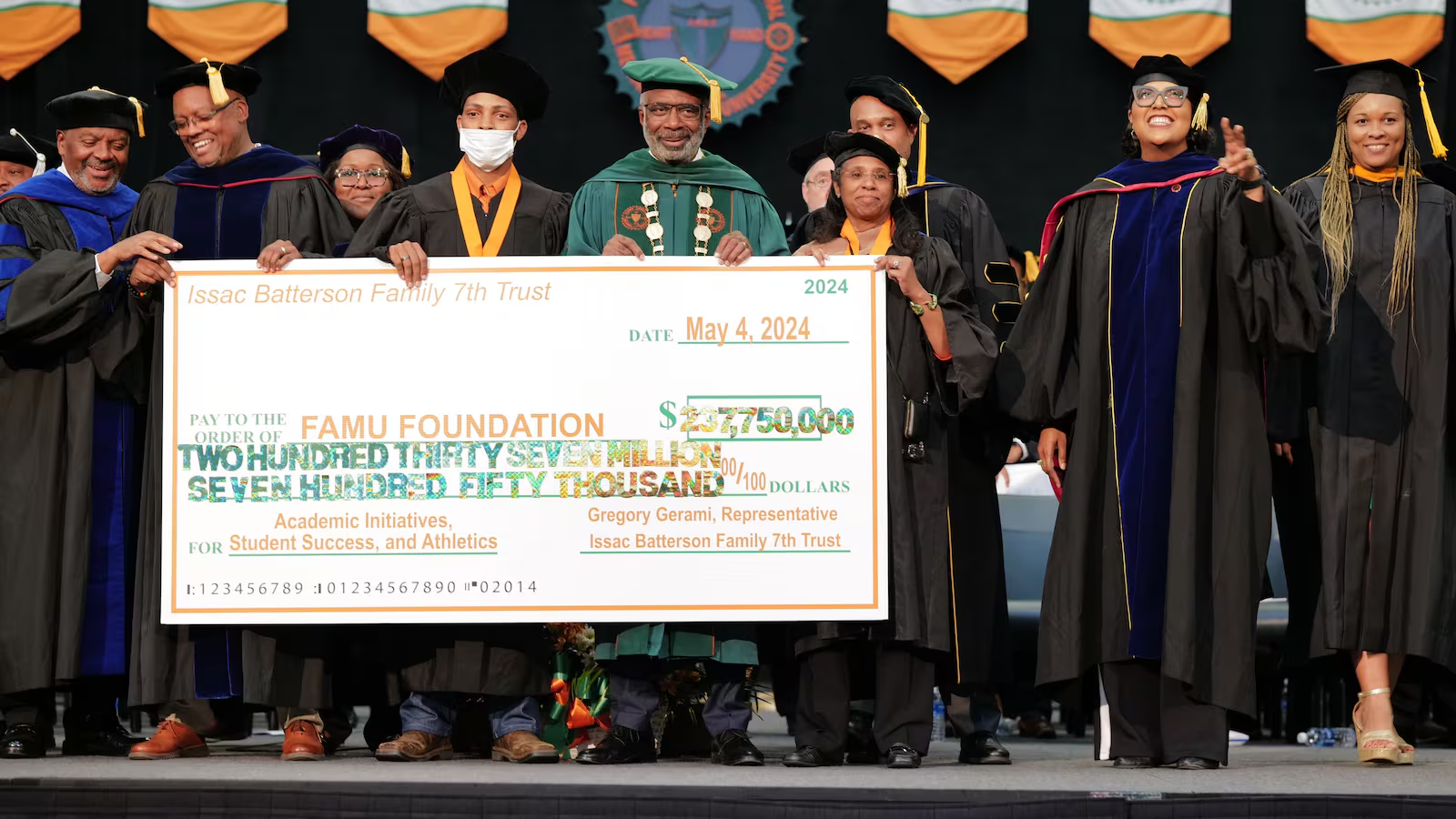During Saturday's commencement ceremony, Florida A&M University announced a shocking $237,750,000 donation to the school from hemp farmer, entrepreneur, and, probably not coincidentally, commencement speaker Gregory Gerami. It's the largest such donation in both the school's history and HBCU history. Since that announcement, there has been a lot of doubt and suspicion about Gerami and his gift, based in part upon his lack of an online footprint, lack of any authentic connection to the school, lack of information about his business, and the practicality of a 30-year-old entrepreneur building a hemp empire so profitable that he could afford to make such a donation. The noise became loud enough that FAMU even felt the need to release a statement on the matter that next day, as reported by the Tallahassee Democrat:
"We are fully aware of the skepticism that sometimes comes with such a large gift. As expected, some individuals in the public are and will continue researching Mr. Gerami. Please know that FAMU has done its due diligence when it comes to this matter. Additionally, Mr. Gerami has and continues to do his own due diligence on things that have been and are happening at FAMU.
"Mr. Gerami’s $237,750,000 stock transfer was received in the same manner in which we have accepted all other stocks donated to the University through the FAMU Foundation Inc. As with any non-cash gift received, such as cryptocurrency, real estate and stocks, it will be converted to cash and recorded appropriately."
As both the statement and Gerami himself make clear, the money has been transferred in the form of stocks donated to the university. As resident Defector businessperson Jasper Wang tells me, somebody in the know would be able to identify it immediately if it was a fraudulent situation. This was the feeling that Gerami himself underlined in a press conference after the donation. "The stocks have been held by the university for over a month now," Gerami said. "So I don't know where the confusion or the skepticism would be since it's already in a financial account with the university."
There's some legitimate reason to wonder whether this skepticism is driven more by some uglier, older suspicions—disbelief that a young black man could make that kind of money without being famous, for instance, or about an HBCU like FAMU being the beneficiary of such funding. Major schools like Alabama or Texas A&M get donations like this all the time and nobody raises an eyebrow. There's something to this, I think, but at least in the latter case the regularity with which big schools get big donations makes people not think twice about schools like those getting donations like that. Historically black colleges and universities historically do not, and the fact that this is the first time a school like FAMU has received a donation of this magnitude makes it newsworthy, whether there were questions swirling around the giver or not.
But even for a big school, this is a lot of money, and honestly the donation being on the up-and-up might lead to just as many questions as it being some opaque scam. This is not the first time Gerami has attempted to make a major donation to a school, for one. Back in 2020, he promised $95 million to Coastal Carolina University, another school with which he had no prior relationship. According to the school, they terminated the agreement due to lack of an unfulfilled early expectation; according to Gerami, he had felt disrespected by the school and terminated their agreement before a stock transfer could take place. Much like with FAMU, CCU officials also had to sign a non-disclosure agreement that has limited the amount of publicly known specifics.
And again, there's that lack of any kind of footprint. Not just from Gerami himself, either: His business, the Batterson Farms Corporation, has a spare, slapdash website and Instagram presence, and the two LinkedIn pages tied to Gerami are not exactly shining advertisements for his success. He ran for city council in Texas twice, in the city of Arlington and the much smaller municipality of Saginaw, and came in last place both times; that is a little embarrassing if you have the money to pay for campaign ads and signs. It's also not exactly the behavior of a wealthy man who wants to keep as low a profile as possible, which Gerami has otherwise held himself out to be.
This only gets more confusing when you begin digging into the Isaac Batterson Family 7th Trust, which is the holding company that donated the stocks to FAMU, or why Batterson is the name on all these companies Gerami allegedly owns. According to the Myrtle Beach Sun News, Gerami's adopted family is the source of much of his fortune, through inheritance and trust money. Gerami is related to Isaac Batterson, the founder of a small town in Texas, through his adopted mother's side, but he says Batterson is not the source of the family's wealth. At any rate, this alleged family wealth is also in dispute, as GoFundMe campaigns have been set up for his adopted mother's medical expenses and adopted brother's funeral costs fairly recently. The Sun News also reports that Gerami was living with his family at his adopted mother's modest $176,000 home around 2020—again, not classic rich-person behavior. There are also the reports that Gerami has tried to pull this move at multiple schools now, most of which quickly turned him away.
Finally, there's the donation itself. Neither Gerami nor FAMU nor the Isaac Batterson Family Trust will come out and say what stocks were donated to the school, beyond that some are invested in hydroponic farming and agricultural businesses. According to a nine-page gift agreement that the school shared, the 14 million shares, which total up to $239 million in intrinsic value, are contained within an equity management account that allows the account holder to sell the stocks.
To put this in layman's terms, as one helpful finance person on Twitter was kind enough to do:
So let's say FAMU wants to cash in on these millions of shares tomorrow. They have to go to the private owner of the company and say, "Buy back my shares." But the owner has the option at any time of saying, "No, I don't want to." You can only sell if they agree to a buyback.
— Brandon Charpied (@btcharpied) May 9, 2024
2/x
This isn't to say that the $239M doesn't exist. But it is to say it makes it much more difficult to track down the money and obtain it than if this were, say, NVIDIA or Apple gifting millions of shares. The question for FAMU should be "What in the books confirmed this valuation?"
— Brandon Charpied (@btcharpied) May 9, 2024
You would hope that FAMU received enough information about the companies whose stocks they received to accept this gift. But also it's hard to prove valuation for a company with a piss poor website and no known public presence. And even if these shares are in different businesses, why not release their names, so everyone understands where the money is coming from? Does anyone believe that if these were shares of, say, Tesla stock, no one would say anything out of respect for an NDA?
Talking to various money people I know (it's Jasper still), this sort of donation is a popular move amongst the wealthy. It's an easy tax cheat for the donor and the school still gets its donation, ostensibly. But it also offers an opening for scam-like activity for those that could pull it off. In the case of Mr. Gerami, it seems like a sort of pump-and-dump scheme—selling (or donating) a stock at an inflated price so that you can get your tax write-off, but leaving virtually no chance that the school will be able to turn it into liquid assets at anywhere near the purported value.
Nothing about Gerami's background, his company's footprint, or the degree of hush-hush secrecy around the terms of his donation adds up. It's not just a writer saying this, either—FAMU's foundation board seems to agree, and had an entire emergency meeting about it that was broadcasted online. The gist of the concern seems to be that the school didn't do quite as much due diligence about approving the gift as they should have, including not getting input from the foundation or the school's board of trustees. It apparently was a stipulation of Gerami's NDA that he wouldn't have to deal with a board approval; and the president of the school, Larry Robinson, saw a huge dollar amount and went after it, despite whatever suspicions he might have had.
That's disheartening, because I really want this money to be real, maybe even as much as FAMU's president seems to. I think it would be great for FAMU specifically, and great for HBCUs generally. And while being beholden to one wealthy scion does not always bode well for these universities, it's still a chance for FAMU to establish itself as the premier destination for young people, especially young black people, in America. It would also be embarrassing if, instead of a life-changing donation, FAMU gets hustled by a confidence man and an overeager president. The school's foundation meeting seemed to go badly enough that Robinson had to declare a "pause" to the donation, seemingly in order to straighten things out. It feels like even the tiniest bit of prodding will be enough to knock over this house of cards. In the meantime, they can sit and hope that the price of hemp will only go up from here.






